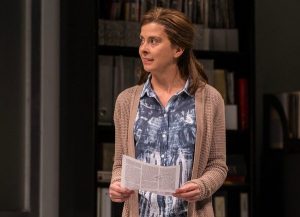SPOILER ALERT: THE PLAYWRIGHT DID IT
Here’s the warning issued to the press on Monday night. It’s about critiquing Goodman Theatre’s imported New York staging of Gloria: “In the hopes of maintaining the integrity of the experience of Gloria for our patrons, the playwright [MacArthur “genius” winner Branden Jacobs-Jenkins] and the director [Evan Cabnet] respectfully request that those writing about the show please refrain from including revealing aspects of the plot.” Nothing could be more pointed or less clear.
Of course, the question that dogs this plea for self-censorship is: What is “revealing”? And which “aspects”? How much synopsis can critics and bloggers reveal without divulging “revelations” essential to the “integrity of the experience”? What if your problem with the play isn’t the horror of its first act finale but the cynicism of its second-act aftermath? Are our hands tied because we can’t regret the means to a more deplorable end?
Here’s a 2015 drama that scathingly depicts the poorly-paid, dead-end, “soul-sucking” jobs of bored and “miserable” 20-something slackers at a Manhattan zine. But it doesn’t stop at spoofing the pity parties, game-playing, networking, toxic solipsism, or back-stabbing of these shallow, ladder-climbing millennials. No, condemning as well as mocking, Jacobs-Jenkins exposes their venal and amoral ambition: A few survivors’”it’s not a blanket indictment’”of a workplace atrocity are willing to profit from other people’s pain by exploiting the experience they survived. They will write books that could become movies. Their cannibalism of a crisis will make them famous. Even better, it will atone for the dreary drudgery they endured, toiling as scribes in the dying publishing industry.
Ironically, nobody exploits the situation’”a bleak office leading to a dire reckoning’”more than the playwright himself. The violence in Gloria is enough to trigger PTSD in folks who never went near a battlefield, and the bitter sequel delivers a paradise for pessimists. All of which makes it peculiar that the author won’t let other writers give away the play’s misanthropic payoff. One character asks, “Is the loss of a human life just an excuse for us to think of ourselves?” Indeed.
Maybe it’s safer if not smarter to avoid discussing the bottom-feeding plot. Better to ignore the characters’ choices, the glib but clever “small talk” dialogue and gallows humor, and the playwright’s skill at conveying the desiccating details of laboring in cubicles. (Here that means penning platitudes about the death of a popular indie musician: More losses will come closer to home.)
Instead let’s consider the thematic implications of “the play that will not speak its story,” to paraphrase Lord Alfred Douglas. At its best this two-hour tour de trauma raises intriguing questions about the limits of journalistic inquiry, whether in self-imposed standards of decency about what not to probe or self-serving “non-disclosure” agreements to stifle free expression and protect the brand. But to the click-baiting, ratings-craving mainstream media and “Starvation Central” websites soliciting followers in order to attract ads, no holds seem barred. “If it bleeds, it leads” is at best a paltry prohibition. Anything goes. Sadly, not a few audience members in the opening night audience, including at least one critic, proved the playwright’s point: If you’re not a casualty, other people’s pain can be a positive pleasure. Most gasped but some laughed.
No question, the lion’s share of the “word of mouth” that Gloria gets comes from its shock effects, not its cheap-shot accusations against greed and indifference. Yet it seems stupid to dare people to see a play that could easily trigger a mental meltdown or a psychological relapse just because we can’t “reveal aspects of the plot.”
It’s presumably okay to reveal the actual names of the Gotham actors’”Kyle Beltran, Catherine Combs, Michael Crane, Jeanine Serralles, Ryan Spahn, and Jennifer Kim (as the most offensive Asian “tiger” bitch you ever endured). They play underachieving stereotypes and overachieving caricatures that you may or not may not recognize caught up in a crisis that’s both calculated and unedifying. Accuracy alert: Two memorable characters have the integrity not to stoop to the occasion. You can only hope the audience identifies with them.
But the play exists to pillory the others. It feeds on its own visceral violence. If beauty is its own excuse for being, perhaps ugliness is too. Let the beholder beware.
photos by Liz Lauren
Gloria
Goodman Theatre
Albert Theatre, 170 North Dearborn
ends on February 19, 2017
for tickets, call 312.443.3800 or visit Goodman Theatre
for more shows, visit Theatre in Chicago










{ 3 comments… read them below or add one }
Sorry if my laughter upset your evening. Rather, I think it kept you awake. We were the first in on this show. No Jeff recommendation, to be sure!
Mr. Bommer, I wish you had written more commentary about the show and less on the instructions to the press. You prattle on about the point the play was making, but appear to be remonstrating the caricatures depicted rather than actually seeing the point of the play at all. Your commentary lost me.
As a season ticket holder for over a decade, and a theatergoer to many other playhouses on a regular basis throughout that same period, I can say that Gloria was one of the most thought-provoking pieces I have seen in some time. The stage execution, the acting, the writing, and the “point” (as it were) were all notable, perhaps exceptional, and certainly memorable. Gloria left a stain on me as a spilled glass of red wine on a linen tablecloth might. It’s a stain, but a reminder of an otherwise fantastic dinner party; kind of a nice reminder of the guests and conversation, and the wine itself.
I can understand why the Goodman doesn’t want the plot divulged, but there needs to be a trigger warning about a horrific act that looks very realistic. Most of the audience I spoke with felt it was a gimmick to support an otherwise terrible script. I say skip Gloria if you have other options.